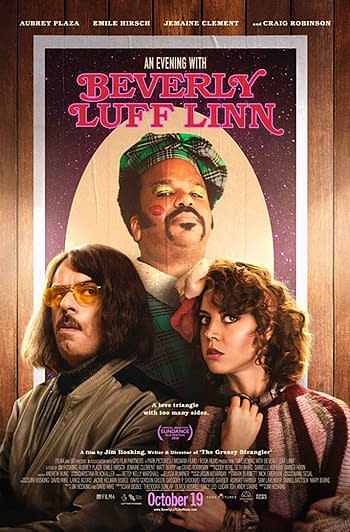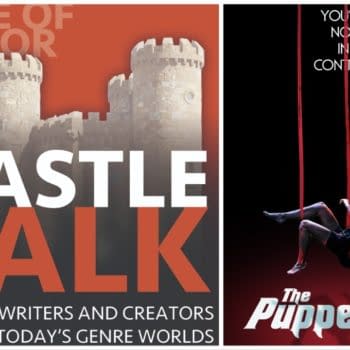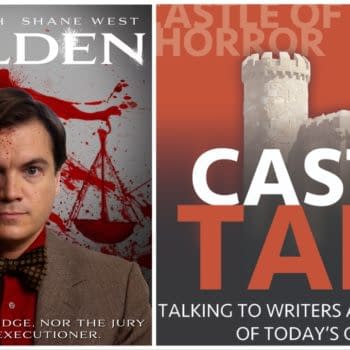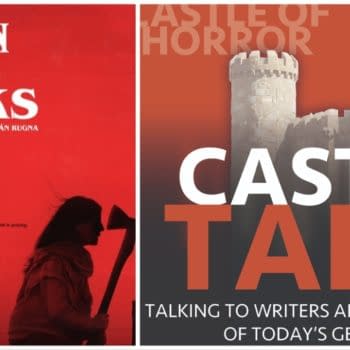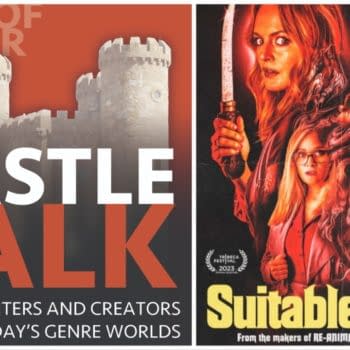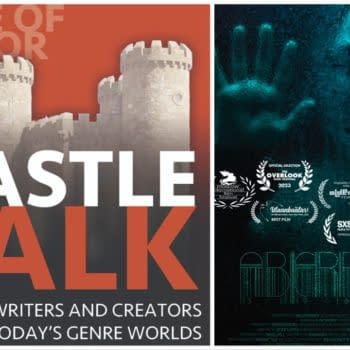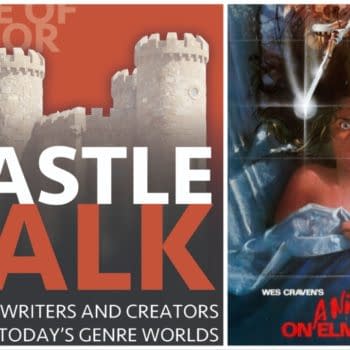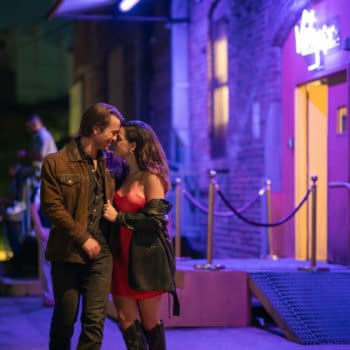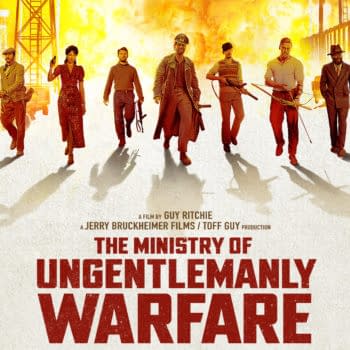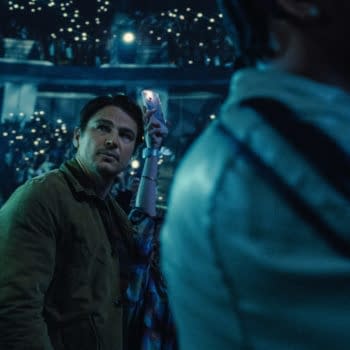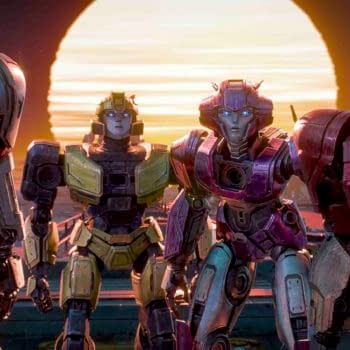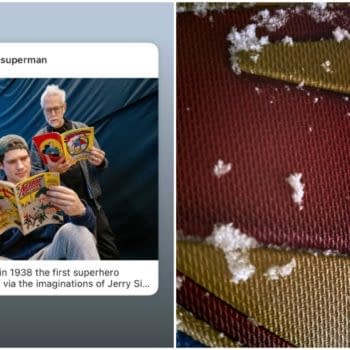Posted in: Interview, Movies | Tagged: an evening with beverly luff linn, Aubey Plaza, Craig Robinson, David Wike, Jim Hosking, Tony Salvaggio
Chatting With 'An Evening With Beverly Luff Linn' Director, Writer
[Editor's note: this piece about An Evening With Beverly Luff Linn team comes to us from Bleeding Cool contributor Tony Salvaggio.]
At this year's Fantastic Fest I was able to catch one of my favorite comedies of the year, An Evening with Beverly Luff Linn. Equal parts charming and absurd, director Jim Hosking (who directed last year's infamous fan favorite The Greasy Strangler) brings us a uniquely quirky comedy. Comedy stalwarts Chris Robinson, Aubrey Plaza, Jemaine Clement and Matt Berry are joined by Emile Hirsch to round out a film that quickly became one of my favorites of this year's Fest.
I was able to sit down with director Jim Hosking and his co-writer David Wike for an enjoyable informal interview about the film after a brief discussion about returning to the festival and the advantage of being able to have cinema with beer.
***
Tony: So going from The Greasy Strangler, and kind of stepping it up in some ways. How did you go about finding this cast?
Jim Hosking: Well, it was a bit of a process. I don't know if we did it any differently than anyone else does it. The first film that I made, it was pretty much a bunch of people that I knew apart from the lady who played Janet. But with this, yeah, we kind of had some people in mind when we were writing the script. We had Emile Hirsch in mind, although I think that was for Jermaine Clement's character originally. You just talk with each other and think about who would we be excited to work with. I don't know, like Craig Robinson just came to mind immediately for Beverly and then it was just like, fuck, there's nobody else who could play that character. Thank God he said he would. We love Aubrey Plaza and we're thrilled to work with her. I had a number of Skypes and meetings with people and most of them said they would do it a couple, so they wouldn't know really, really regretting that (Laughter) Obviously we're joking, no one said they wouldn't do it.
Tony: The dialog definitely has its own cadence, what was your approach in directing that? What was your original vision. Because in some ways it's measured, but there's excitement when there needs to be excitement.
JH: I don't know, someone else tasked me a question about it the other day. I think it was about the start of editing or something, but I was thinking that I probably do like people speaking in a quite deliberate fashion and being sort of quite clear about what they're saying. I probably don't like things happening too quickly. I like films that are kind of quite slow, maybe that's just the speed that my mind goes. They all were playing their parts kind of seriously and, I suppose it's like a virus or something or everyone gets in synch it's kind of like everyone ends up speaking in a certain way.
There was something about, the characters taking themselves quite seriously and being very clear. Because the world is kind of absurd, and it's played like everything is incredibly important. But really when you look at the stakes, they are quite low. It's just what we were finding interesting or what we found funny. I don't want to try to make something really dramatic by having people speak really urgently or to cut really quickly. I try and keep it quite kind of simple.
Tony: When I was watching it, it does have a natural unnaturalness.
JH: I think that's something that I'm not that aware of because people will say that the characters are very deadpan. I don't think they're dead pan at all. Maybe it's that I don't have characters interrupting each other very much. It's more like "Say your line, then say your line". And when I edit I like to create a little bit of space around things and I like when people don't talk, I like awkwardness. Maybe that's also quite an English British thing. You know, we're quite repressed and there's quite a lot of people standing around not knowing what to say to each other and just being awkward, you know, that's just, that's the UK.
Tony: Yeah. I think a lot of my friends from the UK would I agree. So since both screenwriters are here, (and I have worked on collaborative screenwriting as well) I was curious how your collaboration works. How do you go about sharing your unique vision?
JH: We have written another script together as well, so I think it's that we have a similar excitement about working very rigorously but also not knowing where something's going and allowing it to kind of go where it feels like it wants to go. I think we don't really force things too much. We're not sort of driven by plot or you know, we're not trying to write any particular kind of material. I think we just get a buzz out of just kind of seeing, how things develop and where the world goes. There is no right or wrong or a limit to how much of anything there can be. It's just kind of a feeling.
David Wike: I also think it's also an appreciation for, (I mean not to sound sort of arch or something), but it's appreciation for words and language. We really do spend a lot of time on the actual sentences and the dialogue and how we rewrite it so it feels like how you were mentioning at the beginning there's a rhythm. We like that. It's not like someone's sitting there going, "Well that doesn't matter. They could say anything. We'll leave it to the actor to figure out or whatever." There's very much like an appreciation and excitement as to how each character expresses themselves in words.
JH: But it's true that there's not a massive sort of naturalism to it. What I remember from when we're writing it, the kind of stuff that we really, really laugh about is the fact that people can be having conversations, but effectively it's like they're all islands.
They aren't connected. And even if they're married or even if they've got some tremendous history with each other and they're talking about this great relationship they have, there's also this part where it feels like they just don't quite go together and they're from different worlds. It's kind of like real life, but you're just turning it up a few notches.
DW: It's like the stakes between characters are really intertwined. In other words, they seem to need something desperately from the other character.
JH: But they are obsessed with themselves.
DW: But everyone's declaring this sort of like interwoven [feeling]. But really when it comes out of their mouth is just this sort of nonsense about their own sort of perception of the universe and their self importance, you know? We both find that extremely funny.
JH: I think it was also fun to sort of mix up the kinds of characters in the film. For me this was probably the first time that I've really worked with well known actors who are bringing consistent, versatile performances. Then I've got some other character actors, (some of whom I've used before) who have completely different kind of acting style. It was quite interesting to do that. But whether I do that ever again, I don't know. Like the guy who runs the hotel or the guy who is, who is Emile Hirsch's boss – the most powerful people in the film are absolute maniacs. I hope they don't listen to this -[laughs]
Tony: I'm a musician and a soundtrack fan and I was really struck by the score. There's a lot of juxtaposition in scenes. Sometimes it sounds very dire, but it's not necessarily a dire scene. How did you come about approaching the score and coming up with the sound and the synth-y nature of things.
JH: The music is by Andrew Hung who did music for the Greasy Strangler as well. When we started, I was keen to possibly just do a piano score. I just thought it would be completely different to where I've been in the previous film and that just excited me. I liked the idea of just going for something and just seeing how turns out. But then we decided along the way to broaden it and to give it sort of more energy. Andy, he's a very unconventional composer. His background is not film composition. He doesn't even compose to timecode quite a lot of the time. So, it's a pretty unconventional process and I think that all of us, we're all looking for something that's unconventional as well. So you throw all of us together and you just end up with something that's different. I can't think right now about music sort of has like an urgency when the scene is not urgent. There are definitely moments within the film where the music might suddenly make you think, "Oh, this is really important." Whereas otherwise you might not have thought it was.
I'm really keen to put music in a film that feels like it's going to actually have a character and play a part. I just find it strange that there are some films that you watch that you might really enjoy and they might feel really different but the music so boring. I just don't understand [doing that].
Tony: So tell me about your approach to costuming. I enjoy movies like this where there's kind of a timelessness because it kind of looks eighties, but it also looks very like what you'll see in a lot of Eastern European films. Where maybe the style never really caught up. I grew up in a really rural area, where styles didn't necessarily change fast, they went on for far longer than elsewhere and they didn't arrive at necessarily the right time. It just has that kind of feel to me. How did you decide "THIS is how we are going to make this look!"
JH: Well, the costume designer is Christina Blackaller and I've worked with her so much before ( she did the Greasy Strangler as well), so I think that she knows that if I talk to her about a certain kind of thing, she'll also understand it. So if I'm talking about the guys who work in the coffee shop and I say "I don't want them to look like they work in a regular coffee shop. I want them to look like they think they've got really important jobs. In fact, they sort of power dress, they think that a cappuccino is like a new invention and they're really, really bringing something to the people". She'll sort of go somewhere with it. I guess it just develops as I see stuff. Say with Aubrey's character, I unearthed a lot of old photographs of musicians from the seventies and stuff which also fit with Jemaine's character as well. I'd say something like "Oh, I want Aubrey's coat to be like the kind of coat the Grace Jones might've worn in the eighties if she wore like a really big kind of puffy coat or something". It's quite free thinking and it just sort of ends up somewhere. I trust her to, to kind of pull it all together. She's great with just combining loads of incongruous elements, and yet somehow it all feels very designed. Which is something I wouldn't be able to do. That's the good thing about directing, if you have good heads of department you can really lean on them to bring good stuff. You're kind of just there to be like a conductor.
Tony: I get that. Trusting the people you have there is pretty important.
JH: Yeah, but you also don't know until you see it altogether. Like how it's really going feel it. Say for Rodney and Beverly when they are at the hotel and they are in their day to day wear, I think I said to Christine that I wanted them to look like a couple of Victorian gentlemen from the 19th century who were on a golfing holiday in Scotland or something. Because they were they were kind of fixated with Scotland. So she ended up finding these really fantastic knickerbockers and these plaid jackets kind of satin collars or lapels. It's just like really nice specific clothes and it's strange that when you see all the characters together and it could be, you know, Jemaine and Aubrey's characters with Matt Berry and Craig Robinson and somehow it all just kind of comes together and works. But that is the costume designer ['s role] seeing it as a whole.
Tony: So, final question. When you're at festivals and talking about your movie what are the things you wish people would ask about that you think important but no one seems to get to.
JH: Um, I dunno. There was one interview I did once where I remember someone asked me, (it was the only time I had a question like this about the Greasy Strangler) where he said "I feel like you wouldn't have been able to make this film if you hadn't really been feeling a lot of desperation and maybe anger or depression or something." It was quite interesting that he sort of psychoanalyzed me a little bit or something and I sort of thought, "Oh, that's interesting. He's really trying to get into my head a bit." I mean, I don't necessarily want anyone to get into my head, but I remember thinking "Yeah, you're probably right. There probably is quite a lot of anger and desperation and it made me think about it, you know. Because you think that you're making quite sort of pushed comedy or stuff that's kind of quite challenging, maybe visually or aesthetically. And actually that can come from a place of feeling very dissatisfied. Whether it's with what you experienced personally when you watch stuff or with your own life.
I remember I was working with a friend of mine, writing some sort of comedy stuff and I was was just always trying to do stuff that was really, really different than him. And he said "Why do you want to be different? Man? Why'd you want to be so different all the time?!" Getting really frustrated with me and I thought "I don't know, why do I want to be so different?"
Tony: Yeah, it'd be easier sometimes if you weren't [as different]. I can attest to this as well.
JH: I think it'd be boring though. Yeah, but you're right. It's quite hard to start things off and to get like your breaks or whatever, but I suppose I realized the only way that was going to happen was by just making some kind of low budget shit that was my own thing and then luckily I found some people who wanted to get behind me, a little bit. It's not like I made Star Wars.
Tony: Although I would be interested to see your Star Wars.
JH: After this they probably will want me to remake The Empire Strikes back.
Tony: Cool, and thanks a million. I really had a blast with the movie and talking to you about it.
***
An Evening with Beverly Luff Linn is out on Friday October 19th via Video on Demand and in select theaters nation-wide.


